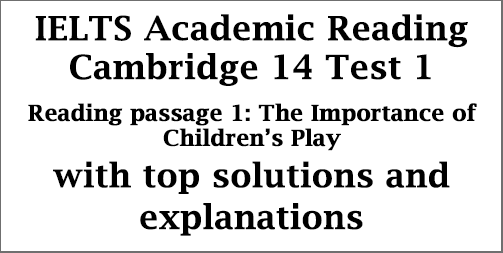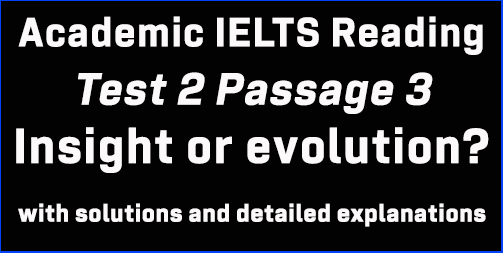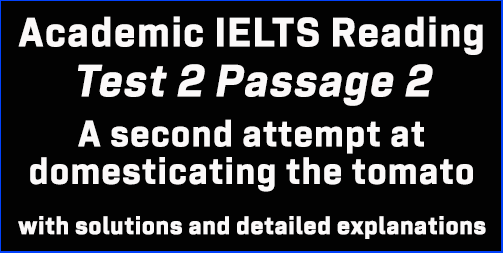IELTS Academic Reading: Cambridge 14, Reading Test 1: Passage 1; The Importance of Children’s Play; with top solutions and detailed explanations
AThis IELTS Reading post focuses on all the solutions for the new IELTS Cambridge 14 Reading Test 1 passage 1 which is entitled ‘The Importance of Children’s Play‘. This is an aimed post for candidates who have major problems in finding Reading Answers. This post can guide you the best to comprehend every Reading answer easily. Finding IELTS Reading answers is a gradual process and I hope this post can help you in this respect.

IELTS Cambridge 14 Test 1: AC Reading Module
Reading Passage 1:
The headline of the passage: The Importance of Children’s Play
Questions 1-8: (Completing notes with ONE WORD only):
[In this type of question, candidates are asked to write only ONE WORD to complete notes on the given topic. For this type of question, first, skim the passage to find the keywords in the paragraph concerned with the answer, and then scan to find the exact word/words.]
Questions 1 and 2 are under the title: Uses of children’s play
Question 1: building a ‘magical kingdom’ may help develop ____________.
Keywords for the question: magical kingdom, help develop
We find the keyword ‘magical kingdom’ in paragraph no. 1. So, we should scan it carefully. In the last lines of the paragraph, the writer says, “Although she isn’t aware of it, this fantasy is helping her take her first steps towards her capacity for creativity and . . . .. ..”
Here, helping her take her first steps towards her capacity = help develop
So, the answer is: creativity
Question 2: board games involve ___________ and turn-taking
Keywords for the question: board games, turn-taking
We find the keyword ‘board game’ in paragraph no. 2, line no. 3. So, we should scan it carefully. The line says, “Later on, when they tire of this and settle down with a board game, she’s learning about the need to follow rules and take turns with a partner.”
Here, take turns with a partner = turn-taking
So, the answer is: rules
Questions 3-6 are under the title: Recent changes affecting children’splay
Question 3: populations of ________ have grown
Keywords for the question: recent changes, populations, grown
The question asks us to find out recent changes regarding populations. We find the answer in paragraph no. 5, lines 1-2. “But we live in changing times, and Whitebread is mindful of a worldwide decline in play, pointing out that over half the people in the world now live in cities.”
Here, we live in changing times = recent changes, over half the people = populations grown
So, the answer is: cities
Opportunities for free play are limited due to:
Questions 4 and 5 : fear of _________
Keywords for the question: opportunities, limited, fear of
The answers can be found in lines 2-5 of paragraph no. 5. The writer says, “The opportunities for free play, …. . . . .. . . . .. . are becoming increasingly scarce.’ he says. Outdoor play is curtailed by perceptions of risk to do with traffic, as well as parents’ increased wish to protect their children from being the victims of crime.”
Here, becoming increasingly scarce = limited, perceptions of risk = fear, parents’ increased wish to protect their children = fear
So, the answers are (in any order):
traffic
crime
Question 6: increased __________ in school
Keywords for the question: increased, school
The answer is in lines 5-6 of paragraph 5. The writer says here, “ . . .. .and by the emphasis on ‘earlier is better’ which is leading to greater competition in academic learning and schools.”
Here, leading to greater = increased
So, the answer is: competition
International policies on children’s play:
Question 7: it is difficult to find __________ to support new policies
Keywords for the question: difficult to find, support new policies
The answer is found in paragraph no. 6. Here, the author says, “International bodies like the United Nations and the European Union have begun to develop policies . … ..” Then in the last line, “ . .. .But what they often lack is the evidence to base policies on.”
Here, what they often lack = it is difficult to find
So, the answer is: evidence
Question 8: research needs to study the impact of play on the rest of the child’s __________.
Keywords for the question: research, need, study, rest of the child’s
The answer lies in lines 2-3 of paragraph no. 8. In the previous paragraph (paragraph no. 7) the writer talks about the need for research to study the impact. Then, in paragraph no. 8, they mention the reaction of Dr Jenny Gibson, “Dr Jenny Gibson agrees, pointing out . .. ., there is very little data on the impact it has on the child’s later life.”
Here, child’s later life = rest of the child’s life
So, the answer is: life
Questions 9-13: TRUE, FALSE, NOT GIVEN
In this type of question, candidates need to find out whether:
The statement in the question matches with the account in the text- TRUE
The statement in the question contradicts the account in the text- FALSE
And the statement in the question has no clear connection with the account in the text- NOT GIVEN
[For this type of question, you can divide each statement into three independent pieces and make your way through with the answer.]
Question 9: Children with good self-control are known to be likely to do well at school later on.
Keywords for this question: good self-control, likely, do well, school, later
The answer lies in paragraph no. 11, “In a study carried out by Baker with toddlers and young pre-schoolers, she found that children with greater self-control solved problems more quickly when exploring an unfamiliar set-up requiring scientific reasoning. ‘This sort of evidence makes us think that giving children the chance to play will make them more successful problem-solvers in the long run.”
So, the lines clearly show that children with self-control do well in the long run (later on).
So, the answer is: TRUE
Question 10: The way a child plays may provide information about possible medical problems.
Keywords for this question: the way child plays, may provide info, possible medical problems
The answer lies in paragraph no. 13, where Dr Gibson says, “… Playful behaviour is also an important indicator of healthy social and emotional development. . .. . .. . . .give us important clues about their well-being and . .. .. . .. .useful in the diagnosis of neurodevelopmental disorders like autism.”
Here, the lines clearly show that the way a child’s plays can be used to identify medical problems (autism).
So, the answer is: TRUE
Question 11: Playing with dolls was found to benefit girls’ writing more than boys’ writing.
Keywords for this question: playing with dolls, benefit, girls’ writing,
We find a reference to playing with dolls in paragraph 14 line 4. But there is no comparison between girls’ writing and boys’ writing.
So, the answer is: NOT GIVEN
Question 12: Children had problems thinking up ideas when they first created the story with Lego.
Keywords for this question: children, problems, thinking up ideas, first created, Lego
The answer is lies in lines 3-5 of paragraph no. 15. “…. Children wrote longer and better-structured stories when they first played with dolls representing characters in the story. In the latest study, children first created their story with Lego, with similar results.”
The lines show the fact that children produced longer and better-structured stories when playing with dolls and Legos. They did not face any problems there. In the last lines of the same paragraph, the writer repeats the result. “With the Lego building.. .. .. …. The whole year of the project.”
So, the answer is: FALSE
Question 13: People nowadays regard children’s play as less significant than they did in the past.
Keywords for this question: nowadays, children’s play, less significant, did in the past
The first line of the last paragraph gives us the answer. “Somehow the importance of play has been lost in recent decades. It’s regarded as something trivial, or even as something negative that contrasts with ‘work’.”
The lines suggest that nowadays (in recent decades) children’s play has become less significant (has been lost, …. Regarded as something trivial)
So, the answer is: TRUE
Click here for solutions to Cambridge 14 Test 1 Reading passage 2
Click here for solutions to Cambridge 14 Test 1 Reading passage 3




This website is the most useful site regarding IELTS Reading that I’ve ever seen.
I need reading passage 2 answer plz
plzz give the passage also.i need full passage.
Dear Kaur, sorry, I can’t do that. Please, download the book from Amazon.
I will send u the paragraph if u want
I have full passage
best
Thanks
9th question is not comprehensive for the right answer , there is no mention about school in this paragraph
hope I knew your website soon. Too good!!!!!!!! love you!!